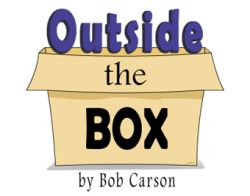Swim with the whales
December 18, 2017,by Bob Carson
Editor’s Note: The USTA website is pleased to present freelance writer Bob Carson and his popular “Outside the Box” features. This monthly series is a menu of outlandish proposals presented with a wink — but the purpose behind them is serious. The views contained in this column are that of the author alone, and do not necessarily represent the opinions or views of the United States Trotting Association.

Bob Carson
As a devotee of harness racing, you might consider playing this game. For those of us on the lower rungs of the fiscal ladder, this game will offer a hypothetical chance to indulge your passion and match your wits against folks with much deeper pockets.
Each year, harness racing enthusiasts scour the pedigrees of the new crop as soon as the sales catalogues are available. We click on countless videos of horses trotting back and forth in paddocks. We go deep into the black type and percentages. We know if we had enough disposable income, we could pluck out yearlings that develop into champions.
We watch the sales and when the auctioneer’s gavel falls, we cannot fathom how some yearlings sell for high prices and why some of our favorites sell for so little. Many of us try to remember our top choices when racing season rolls around. Usually we forget, or lose the paper where we jotted them down.
Let’s not forget them.
Let’s follow our selections after the yearling sales have concluded.
Let’s see if we are as smart as we think we are.
Let’s have some fun.
Let’s help some charities and horse rescue organizations.

This brain game begins after the annual yearling sales. In this crude prototype, you play against 19 others. The operator of this contest could be anyone. The premise is very simple.
To play, you pay $200 of real money as your entry fee. Upon payment, each player receives a hypothetical bankroll of $200,000.
You and your fellow players each pick four horses from a select group without exceeding your $200,000 bankroll. The four yearlings must come from a designated pool that sold at public auction. What pool? The designated pool could vary. The pool of yearlings could be national, state, trotter, pacer, sires, sales venue, breeding farm consignment, whatever.
For demonstration purposes, let us choose a single breeding farm — Diamond Creek — and a single sale — the Lexington Selected Sale.
Last fall, Diamond Creek sent 34 yearlings through the ring that sold for $2,329,000, which is an average of $68,500. This will be our designated pool. Only the 34 horses sold at this auction are in play.
We print out a list of these yearlings, return to the sales catalogues, determine value and make our choices wisely. You have until New Year’s Day to do your research and “buy” four of the Diamond Creek horses, staying within your $200,000 budget.
At this point, we complete our hypothetical stable by:
- Creating a unique stable name
- E-mailing our four selections
- Designating a favorite charity
Here is my stable:
Stable Name: Pay It Forward Stable
Four Diamond Creek horses to race in 2018
- Pendleton – $37,000
- Bayonet – $75,000
- Cadence – $47,000
- Allegory – $30,000
Charity: The Herren Project, started by NBA basketball player and former OxyContin addict Chris Herren, this charity helps to fund drug treatment and create sober cultures.
Nineteen other players follow this same process. They send in their list of four horses, their designated charity, and a check for $200. In a few weeks, we all receive e-mailed spreadsheets that list the other stables and the horses in their stable.
Then we wait out the long training season and watch for horses to begin to drop into qualifiers. We can create virtual stables on Pathway that notify you each time your horses or other horses in the pool are racing.
When racing season begins, you log on to watch the races and cheer for your stable. You follow your stable with interest all season long and receive monthly updates from the contest organizer documenting the latest standings.
The winner is the stable that has the highest purse earnings at the end of the 2018 2-year-old racing season.
What do you win? Let me suggest we make this more challenging than cut-throat, more charity than cash grab.
- $2,000 (from entry fees) goes to the winner
- $1,000 to retired racehorse rescue funding
- $1,000 to the designated charity
Mostly, this would be for fun. However, other benefits are possible including ramped up interest in harness racing and creating positive publicity when issuing checks to worthy organizations. Hypothetical players might someday purchase a yearling, outreach is also possible if players find protégés in the non-racing world to watch the races and join their stable.
Simple and fun.
Want to play?
